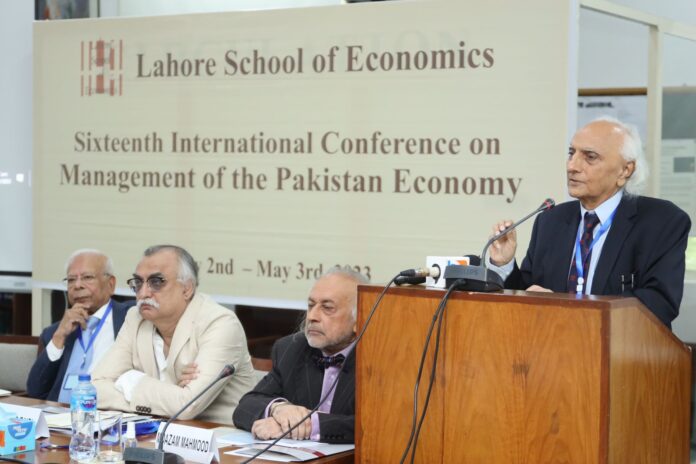LAHORE: With the rain falling outside on an unseasonably cool morning for May in Lahore, the Lahore School of Economics (LSE) opened the “Managing Pakistan’s Economy” Conference 2023. This is the 16th conference of this name hosted at LSE, but perhaps none of the other 15 editions have been held in such dire economic straits.
Outside the walls of LSE, the economy has been in freefall. The government is in the process of negotiating what is seeming to be an impossible IMF programme, and the threat of default has everyone in nervous sweats. All of these factors combined with rising inflation mean the need has never been greater to find solutions to Pakistan’s economic management.
Right off the bat, the immediate concern seemed to be collection of data. In a country where core data is unavailable, how do you manage an economy of 250 million people?
Dr. Shahid Chaudhry, rector of the Lahore School of Economics, in his inaugural remarks stated that the current difficult economic situation faced by Pakistan emanated in large part from the effects of Covid in 2019-20 and the Ukraine war starting in 2022. The Pakistan economy was now stabilising and after almost no growth in 2022-23, it was likely to grow to resume modest growth in 2023-24.
“The Pakistani economy will start an upward growth trajectory in the next fiscal year. The reasons behind this was (1) the Current Account seems to be recovering from its deep deficits – albeit with import controls, that need to be better targeted,” said Dr. Moazam Mahmood, Professor of Economics at the Lahore School.
Dr. Rashid Amjad, Professor & Director of the Graduate Institute of Development Studies at the Lahore School, and Almazia Shahzad analysed the post-2019 shifts towards a market-driven exchange rate and found that while the exchange rate may have been overvalued in the past, this has been reversed recently which should make exports more competitive. The paper advised to manage Pakistan’s market-determined exchange rate regime through building up and maintaining adequate reserves.
Dr. Azam Chaudhry, Pro Rector, Dean and Professor of Economics at the Lahore School of Economics, estimated capital flight from Pakistan using the data from the balance of payments and the level of trade misinvoicing in Pakistan. Dr. Azam concluded that in the last 10 years, capital flight has reached to significant levels over the last few years reaching almost 5 billion dollars.
He also showed that capital flight is extremely sensitive to economic conditions which means that sustained economic growth will tempt capital to return. If the Pakistani economy can rebound quickly to a 4-5% growth rate, it is estimated that at least $5.5-6 billion of capital can flow back to Pakistan each year.
Mr. Syed Shabbar Zaidi discussed the oversized role of federally collected tax revenues in the total tax pool of Pakistan and how the large transfers of revenues as a result of the 18th Amendment to the provinces has resulted in them not developing the capacity to generate revenues on their own.
Dr. Matthew McCartney, of the Chartered Cities Institute, and a managing editor of the Lahore School’s influential Lahore Journal of Economics, provided an overview of two relatively successful periods of economic and political stabilisation in Pakistan, 2000-2001 and 2013-2106 and asked what lessons can be learned and implemented in 2023. Dr. Matthew proposes reforms in delimited economic areas – Special Economic Zones (SEZs) and independent ‘Pockets of Efficiency’ – independent central bank, revenue collection authority, telecoms regulatory.
Drs. Moazam Mahmood, Azam Chaudhry and Shamyla Chaudhry highlighted how fiscal deficits can drive trade deficits. They highlighted that a significant amount of debt is the result of the foreign debt incurred as a result of the recurring current account devidits. A smaller though still significant amount of the debt that has accumulated as a result of the need to fund the government’s high annual budget deficit. Highlights that policy to then alleviate future BOP crises has to acknowledge that part (62%) of the problem lies in the tradables sector.. The FY 2022 level of Gov expenditure of 8 % of GDP is financed externally by a quarter, which is 2 % of GDP. The authors gave suggestions for debt management.
Naeem Sheikh and Arshad Hassan, of the Lahore School of Economics, discussed the causes and ramifications of low tax revenue mobilization and tax compliance in Pakistan. The largest impact on compliance will result from the real- time exchange and analysis of taxpayer/trader data among the FBR, provincial tax authorities and withholding agents.
Dr. Theresa Chaudhry, Professor of Economics at the Lahore School, co-Director of the Innovation and Technology Centre at the Lahore School and one of the editors of the Lahore Journal of Economics, and Hamna Ahmad of the Lahore School of Economic asked whether Pakistan can look to the service economy, specifically to the gig economy, as a source of dynamic export growth. They used unique data from IT services offered online to foreign companies to understand the types of jobs that are being demanded, the characteristics of those offering IT services and the renumeration offered to those offering services. They also discussed the potential for IT exports and also discussed government policies to promote IT exports.
Dr. Naved Hamid, Ali Chaudhry and Murtaza Syed discussed, how monetary policy could have reduced the impact of the current economic crises and lessons, which can be drawn for monetary policy in the future. The authors proposed (1) to improve coverage and frequency of domestic demand indicators (especially quarterly GDP) (2) Maintain healthy degree of caution around fiscal projections (especially during times of political stress and around elections) (3) Be conservative about external prospects (current account, FX reserves and foreign inflows) and their impact on the exchange rate and imported inflation (4) Beware of supply shocks that can quickly morph into an inflationary spiral through expectations (pay attention to the whole distribution of expectations measures, especially as Pakistan has a history of ‘sticky’ core inflation)




